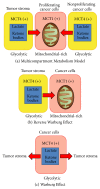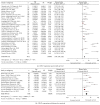Prognostic Indications of Elevated MCT4 and CD147 across Cancer Types: A Meta-Analysis
- PMID: 26779534
- PMCID: PMC4686628
- DOI: 10.1155/2015/242437
Prognostic Indications of Elevated MCT4 and CD147 across Cancer Types: A Meta-Analysis
Abstract
Background: Metabolism in the tumor microenvironment can play a critical role in tumorigenesis and tumor aggression. Metabolic coupling may occur between tumor compartments; this phenomenon can be prognostically significant and may be conserved across tumor types. Monocarboxylate transporters (MCTs) play an integral role in cellular metabolism via lactate transport and have been implicated in metabolic synergy in tumors. The transporters MCT1 and MCT4 are regulated via expression of their chaperone, CD147.
Methods: We conducted a meta-analysis of existing publications on the relationship between MCT1, MCT4, and CD147 expression and overall survival and disease-free survival in cancer, using hazard ratios derived via multivariate Cox regression analyses.
Results: Increased MCT4 expressions in the tumor microenvironment, cancer cells, or stromal cells were all associated with decreased overall survival and decreased disease-free survival (p < 0.001 for all analyses). Increased CD147 expression in cancer cells was associated with decreased overall survival and disease-free survival (p < 0.0001 for both analyses). Few studies were available on MCT1 expression; MCT1 expression was not clearly associated with overall or disease-free survival.
Conclusion: MCT4 and CD147 expression correlate with worse prognosis across many cancer types. These results warrant further investigation of these associations.
Figures





References
-
- Philp N. J., Yoon H., Lombardi L. Mouse MCT3 gene is expressed preferentially in retinal pigment and choroid plexus epithelia. American Journal of Physiology—Cell Physiology. 2001;280(5):C1319–C1326. - PubMed
Publication types
MeSH terms
Substances
Grants and funding
LinkOut - more resources
Full Text Sources
Other Literature Sources
Miscellaneous

